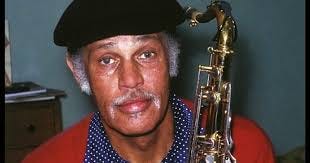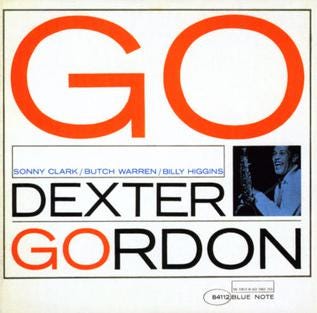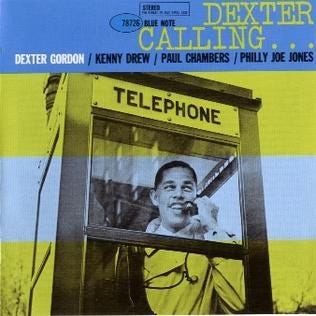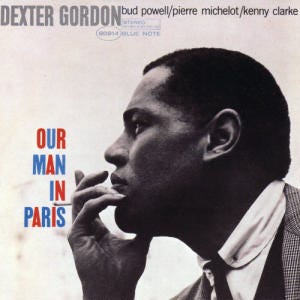Some years ago, I was invited to a holiday party at Howard Brofsky's apartment on the Upper West Side of Manhattan. Howard was a professor of music theory at City College in New York. He also played the trumpet and was a huge jazz fan. He knew how to improvise on American Standards and Bebop tunes and was enamored of the jazz musician’s life.
I was told to bring my instrument, as the party included a jam session with other musicians he had invited. I decided to go for the playing and networking opportunity.
When I arrived, the jam session started soon after. The assembled group played a few tunes when the door buzzer rang. My jaw dropped, and my knees buckled when I saw Dexter Gordon stroll in with his tenor saxophone in hand. Without ceremony, he assembled his instrument and, within a few minutes, was jamming with us. I thought I was dreaming.
Dexter Gordon as he looked at the time of this story.
Dexter was enjoying wide recognition and praise for his triumphant return to the United States after living overseas in “Jazz exile” for many years. His career was now front and center, and he was arguably the most visible and well-known jazz musician on the scene. I was impressed by his self-effacing demeanor at our jam session, just being “One of the cats.” It helped the rest of us settle down and get over our awestruck mindsets.
He played about five tunes and then said he had to attend another engagement. Before he left, he pulled me aside, told me he found my sound and beat appealing, and asked me to stay in touch. Again, I was in disbelief.
Here are a few of my favorite Dexter Gordon recordings that I frequently listened to as I was “growing up:”
I wore these records out. I listened so often that you can see light coming from within the grooves today!
Several months later, Dexter was opening a six-night stand at the Village Vanguard in New York City, and I decided to go down and check it all out. I had heard him perform numerous times, but now I felt I had a more direct connection to him. About a week before his engagement, I heard through the grapevine that Dexter was looking to replace his bass player, with whom he had become dissatisfied. Another bassist who had worked with him in the past called me and advised me to sit in at the Vanguard engagement. That bassist had also informed Dexter that I would be coming by.
I caught their first and second sets on Sunday night, the final night of their engagement. After the second set, I returned to the kitchen (aka dressing room), where the musicians would hang out during intermissions. I said hello to Dexter, and he immediately remembered me. I asked if I might sit in on their third and final set. He responded, “Sure, come on up.” My heart rate doubled.
I sat next to the bandstand as their third set began. On one hand, I was excited to get a chance to sit in, and I was aware of its possible implications. At the same time, I was morally conflicted as part of me felt as if I was there to steal the other bassist’s gig. It never occurred to me that any gig cannot be stolen. It can only be lost by the individual in question.
The set progressed, and looking at my watch, I surmised that the set was soon to end. I saw my chance to sit in evaporating. I finally got up the nerve to stand and ask Dexter if I might sit in. He motioned for me to come up. I took the other bassist’s instrument and, in what seemed like a nanosecond, Dexter counted off a tune he enjoyed playing called Fried Bananas. Fortunately for me, it was part of his repertoire I was familiar with, as it was a contrafact of a familiar standard called It Could Happen To You.
Dexter played the first solo, containing several choruses, as was his habit. I think the pianist was Kirk Lightsey, who took the next solo. The solo spot was then handed off to me, and I did what I could, trying to demonstrate competence without trying to “impress.” With that, the tune finally ended, and the night ended.
As I went to thank Dexter, he looked at me with a somewhat puzzled expression and, as he was leaving, leaned over and said, “So you don’t want to play with me? Where were you?” With that, he walked away and out of the club. I had no idea how or why he had such an impression, and I thought that sitting in that would demonstrate my desire.
I remained confused until a couple of days afterward when word got back to me that Dexter had intended for me to sit in for the entire third set, and in his mind, that would be my audition for the bass chair. He wanted to see the range of my abilities within an expanse of his current repertoire and to observe any chemistry I might have with Kirk Lightsey and his drummer, Eddie Gladden. Since he was not explicit (somewhat cryptic) when we spoke after the second set that Sunday night, I assumed he would call me up to sit in when he was ready. I thought that was the standard protocol. It still is to this day.
After realizing what had occurred, I realized that any chance of having the honor and privilege of being the bassist in the Dexter Gordon Quartet likely came and went on that fateful Sunday night at the Village Vanguard. I must admit, I found it rather depressing and discouraging.
Fortunately, I was busy at the time, freelancing around New York and touring with various bands, so my attention soon shifted to the present, and my Dexter debacle took a back seat in my mindset.
This is how things sometimes work out for the freelance jazz musician in New York. Opportunities can appear unexpectedly and can be seized or not within minutes of playing a single tune.
That was quite some time ago. At my age today, I can see the big picture and put it into a healthy perspective. As I look at my career and life since that time, I now realize that had I gotten the gig with Dexter Gordon at that time, as great as that would have been, it would have deprived me the opportunity to work with a veritable “who’s who” on the New York scene that I have been fortunate to align myself with in the proceeding years. And there have been many!
I often wonder if there is such a thing as destiny or if we are merely insignificant specks in the universe just randomly roaming about until we expire. Of course, that is an eternal question that will likely remain unanswered.
But there is one thing I do know. Whether by destiny or randomness, where I have wound up, and whatever my current state of affairs, I am one very grateful and happy camper. Things have turned out as they were supposed to.
It doesn’t matter. What matters is that I am enjoying life and making the most of it in various ways, until that final curtain decides to descend. Acceptance is the key.
The happy camper enjoying seafood last August at my favorite Newport, RI restaurant.
TC
A Jazz Musician's Diary is a reader-supported publication. To further support my work, please consider nominally upgrading your subscription and receiving extra perks for your patronage. Thank you!









All of us carry a mental list — a quiet inventory of what could have been. Moments that linger like ghosts in the corridors of memory. These are the fork-in-the-road incidents: the job we didn’t take, the phone call we never made, the person we let go, the dream we put on hold. Each one could’ve sent our lives down a completely different path.
But what governs those pivotal moments? Is it fate — some cosmic design unfolding with eerie precision? Or is it our own choices, shaped by fear, hope, instinct, or chance? Maybe it’s both. Maybe fate lays out the options, but it’s our decisions that give them weight. The truth is, we never really know what might’ve happened. All we can do is live with the echoes, learn from them, and keep walking forward — one choice at a time.
Whoa—that’s some deep s—t. Of course, life’s twists and turns are unpredictable—and as the late Sydney Harris once wrote, ‘our ignorance is our impetus.’
But your writing of Dex, the jam sessions, the clubs, the songs, are eloquent and moving.
I’ve got my favourite songs from the albums you listed, perhaps share some of yours with the readers?